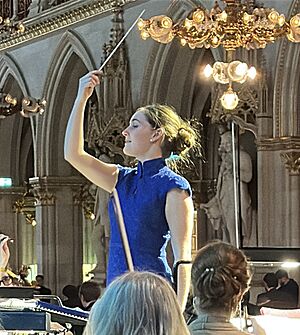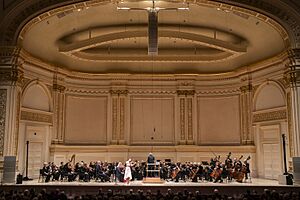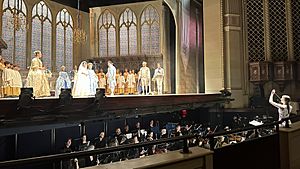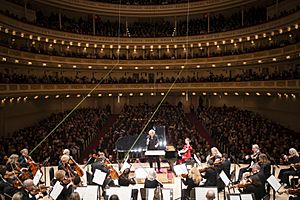Alma Deutscher facts for kids
Quick facts for kids
Alma Deutscher
|
|
|---|---|

Deutscher in 2025
|
|
| Born |
Alma Elizabeth Deutscher
19 February 2005 Basingstoke, England
|
| Education | University of Music and Performing Arts Vienna |
| Occupation |
|
|
Notable work
|
Cinderella Waltz of the Sirens |
| Parent(s) | Janie Deutscher (mother) Guy Deutscher (father) |
Alma Elizabeth Deutscher (born 19 February 2005) is a British composer, pianist, violinist, and conductor. She was a child prodigy, meaning she showed amazing talent from a very young age.
Alma wrote her first piano sonata when she was only five years old. At seven, she finished a short opera called The Sweeper of Dreams. By age nine, she had written a violin concerto.
When she was ten, Alma created her first full-length opera, Cinderella. This opera was first performed in Vienna, Austria, in 2016. A famous conductor, Zubin Mehta, supported the show. It then had its U.S. premiere in 2017. Alma's piano concerto was first performed when she was 12. She has lived in Vienna, Austria, since 2018. In 2019, she performed her own music at Carnegie Hall in New York.
Contents
Alma's Early Life and Learning
Alma Elizabeth Deutscher was born on 19 February 2005, in Basingstoke, England. Her mother, Janie Deutscher, is a literary scholar. Her father, Guy Deutscher, is a linguist. Alma also has a younger sister named Helen Clara.
Alma started playing the piano at age two and the violin at three. Her love for music was clear very early on. She could sing perfectly in tune before she could even speak. She could also read music before she could read words.
In 2017, Alma shared a memory from when she was three. She heard a lullaby by Richard Strauss and loved it. She asked her parents, "How could music be so beautiful?" For her third birthday, she got a small violin. Her parents thought it would be just a toy. But Alma was so excited and played it for days. So, her parents found her a teacher. Within a year, she was playing Handel sonatas.
At four, she was making up music on the piano. By five, she started writing down her own songs. At six, she could write clear music and finished her first piano sonata. This was recorded and released in 2013. At seven, she wrote her first short opera, The Sweeper of Dreams. At nine, she wrote a violin concerto. Her first full-length opera was written when she was ten.
Alma was taught at home until she was 16. Her parents decided this after she cried on her first school orientation day. She told them, "they haven't taught me to read and write." Her parents realized that her "volcanic imagination" needed freedom. They felt this freedom could not be found in a regular school. Alma herself said in 2015, "I never want to go to school. I have to go outside and get fresh air, and read." In 2017, she added, "I think that I learn at home in one hour what it would take at school five hours to learn."
In a 2017 BBC documentary, Alan Yentob described Alma's imaginative world. She created an imaginary country called "Transylvanian." It had its own language and, most importantly, its own music. She made up composers for this land, like Antonin Yellowsink and Ashy. Each imaginary composer had a different musical style. Alma would assign her early songs to these composers.
Alma's early music lessons focused on making up music on the spot. This was based on an old Italian teaching method called Partimenti. Professor Robert Gjerdingen helped her with exercises. She also had lessons in improvisation with Tobias Cramm. This helped her become fluent in the musical style of the 1700s. She called it her musical "mother tongue."
Alma became well-known in 2012, when she was seven. Writer Stephen Fry saw her YouTube videos and said, "Simply mind-blowing: Alma Deutscher playing her own compositions. A new Mozart?" In 2014, a TV show with pianist Arie Vardi featured Alma. This brought her to the attention of important people in classical music, like conductor Zubin Mehta. Also in 2014, a popular YouTube video by musician Kutiman used a repeating musical part from one of Alma's early videos.
In 2017, a CBS-60 Minutes story about Alma won an Emmy Award. In 2018, Alma and her family moved to Vienna. She told The New York Times in 2019, "I grew up on the music of Mozart, Schubert, Beethoven, and Haydn. Musically speaking, I think that Vienna's always been my home."
In 2021, she was accepted into the conducting program at the University of Music and Performing Arts Vienna. She studies with conductor Johannes Wildner. At 16, she might have been the youngest student ever in this program. Famous conductors like Zubin Mehta also studied there.
How Alma Creates Music
Alma Deutscher's music is known for its beautiful melodies. The Austrian newspaper Wiener Zeitung called her a "Melodist by High Grace." Her melodies can show deep sadness or great longing. Alma says her melodies often come to her without effort, sometimes even in her dreams. The start of her first short opera, The Sweeper of Dreams, came to her fully formed in a dream.
Alma has also described a special excited feeling she calls an "improvising mood." She told the Daily Telegraph in 2016, "When I am in an improvising mood, melodies burst from my fingertips." When she was younger, she also said melodies came to her when she skipped with her "magical" skipping rope. In 2019, she told the New York Times, "When I was younger, I really thought it was the rope that gave me inspiration. Now, I know it's not really the rope, it's the state of mind that I get into when I wave it around."
However, Alma has explained that hearing melodies is just the start. Turning them into complete, polished pieces is hard work. She told the Financial Times that the difficult part is developing the ideas. It's about making them into a "coherent structure," which is "extremely difficult."
From a young age, Alma has wanted to compose beautiful music. She wants to bring melody and harmony back to modern classical music. At a music festival in 2017, she spoke about her style. She said many people told her that beautiful melodies are not allowed in 21st-century classical music. They said music must show the complexity and ugliness of the modern world.
Alma disagreed: "But I think that these people just got a little bit confused. If the world is so ugly, then what's the point of making it even uglier with ugly music?" She said the lullaby by Richard Strauss was her first inspiration for creating beauty. In another interview, she explained, "Melody is the essence of music – this is not just my own musical aesthetics, it's the aesthetics of almost everyone, young and old." She believes the most loved music has the best tunes.
In 2019, she said at the Vienna State Opera, "Perhaps there is also a place in European Culture for harmony." In 2023, after her third opera premiered, she told German Radio, "For an art form to stay alive... you always need something new and fresh. But you need new music which speaks to people, which moves them, which brings them solace, which entertains them."
Alma's Operas
The Sweeper of Dreams (2012)
Alma's first completed opera was written when she was seven. It's a short work inspired by Neil Gaiman's story, "The Sweeper of Dreams." The words were adapted by Elizabeth Adlington. Parts of the music came to Alma in a dream. The opera was first performed in Israel in 2013.
The story is about a job for a Sweeper of Dreams, who helps people forget nightmares. Three older men on a committee are surprised that the only person applying is Alex, a 16-year-old girl. They make fun of her for being young and female.
The idea of strong women is often seen in Alma's operas. This is also a main theme in her full-length opera, Cinderella. She told The New York Times in 2019, "I'm a very strong feminist and I'm really happy that I was born now, when girls are allowed to develop their talents." She likes stories about women who overcome challenges.
Cinderella (2015–2020)
Alma's first full-length opera is based on the fairy tale of Cinderella. But she made some big changes to the story. In her version, Cinderella is a composer, and the prince is a poet. Instead of a glass slipper, a beautiful melody that Cinderella sings helps the prince find her. Alma said it was important that Cinderella was not just a pretty girl. The prince falls in love with Cinderella because of her musical talent.
Alma worked on Cinderella for at least five years, from age nine to fifteen. She kept adding to it and changing it. The first version was performed in Israel in 2015, when Alma was ten. An orchestral version premiered in Vienna in 2016. Conductor Zubin Mehta supported this production. News about the sold-out shows appeared worldwide. Critics in Vienna were amazed by Alma's orchestral writing and the beauty of her melodies.
Alma made the opera even better for its sold-out U.S. premiere in 2017 at Opera San Jose. The New Criterion called it "an opera of astounding wit, craft, and musical beauty." They said the amount of music for the orchestra and singers was "stunning." Opera Today called it "a young talent's sensational burst to prominence."
The Vienna State Opera put on its own version for children in 2018 and 2020. In 2019–2020, Alma revised the opera again for a production at the Salzburg State Theatre. She added a children's chorus. In 2022, Alma conducted Cinderella herself in the U.S. for the first time. This was a new showing of the 2017 Opera San Jose production. The production was released on YouTube in 2023.
The Emperor's New Waltz (2023)
Alma's second full-length opera is called "The Emperor's New Waltz" (German: Des Kaisers neue Walzer). The Salzburg State Theatre asked her to write it. It premiered there in March 2023.
Alma explained the main ideas for this musical comedy. She wanted to tell a beautiful love story between two young people. She also wanted to show how classical music and pop music can come together. She aimed to write a musical comedy for everyone, not just opera fans. She also wanted to make fun of modern classical music that sounds "tuneless" or like "noise."
Alma wanted to make this musical comedy less strict than traditional opera. Her main character, Jonas, is a pop singer. He sings songs with a guitar and raps over Mozart. But he also sings in a complex classical style. Alma wanted to show that opera and musicals are very similar. She dreams that young people will go to a musical and realize that opera can be beautiful too.
The Salzburg State Theatre describes the story: It's about truth and pretending, and how music can connect people. Jonas, a gardener, and Leonie, a rich heiress, are very different. They don't like each other at first. But they both dream of studying at a music academy. Leonie's father, a fashion boss, wants her to marry a famous modern composer. Leonie visits the university disguised as a boy and meets Jonas. Together, they discover the composer has selfish plans.
Awards and Honors
- In May 2021, Alma received the Leonardo da Vinci International Award. She was 16, the youngest person ever to get this award.
- In October 2019, Alma was given the European Culture Prize (Young Generation Award). This happened at the Vienna State Opera.
- In October 2019, Alma received the Beijing Music Festival Young Artist Award in Beijing.
- In September 2019, the German magazine Stern chose Alma as one of its twelve "Heroes of Tomorrow." At 14, she was the youngest of the twelve.
Performances and Recordings
Alma has played her own music as a soloist with famous orchestras worldwide. These include the Israel Philharmonic Orchestra, Royal Philharmonic Orchestra, and Orchestra of St. Luke's in New York. She has also given concerts of her own music at major festivals. She has performed for the Austrian Chancellor on important occasions in Vienna.
Some notable live performances include:
- Alma's performance at age 10 at the Google Zeitgeist Conference in 2015. She appeared with physicist Stephen Hawking.
- The opening concert of the Carinthischer Sommer Music Festival in Austria in 2017. Alma performed her own violin concerto and the first performance of her piano concerto.
Alma's sold-out debut at Carnegie Hall in New York in 2019. This concert received many standing ovations. Critics called it "a night of increasing musical wonder." The concert featured only Alma's own music. She performed her Violin Concerto and Piano Concerto as a soloist. It also included parts from her opera Cinderella and her concert waltz, Waltz of the Sirens. Alma explained her musical ideas to the audience. She talked about bringing harmony and beauty back to modern classical music. The event was streamed live. A recording of the Waltz of the Sirens from the concert has been watched over 2.4 million times on YouTube. A short video of Alma conducting her waltz became very popular on TikTok in May 2022.
Notable television appearances:
- In 2017, Alma was the subject of an hour-long BBC documentary. It followed her during rehearsals for the premiere of her opera Cinderella in Vienna in 2016.
- In 2017, she was also featured in a CBS-60 Minutes documentary. This won an Emmy Award in 2018.
- At age 9, Alma appeared on the program Intermezzo With Arik in Israel. This performance and interview brought her to the attention of conductor Zubin Mehta.
Alma has appeared on TV shows around the world, including The Ellen DeGeneres Show and NBC Today.
The first album of Alma's music, "The Music of Alma Deutscher," was released in 2013 when she was 8. In 2019, Sony Classical Records released "From My Book of Melodies." This piano album features Alma's compositions from ages four to fourteen. Two productions of her opera Cinderella have been released on DVD.
Alma's collection of piano pieces, From My Book of Melodies, was published in 2020. It was released by American classical music publishers G. Schirmer and Hal Leonard.
List of Compositions
Ballets
- The Euterpides, first performed in 2025.
Operas
- The Sweeper of Dreams (mini-opera, written aged 7)
- Cinderella, a full-length opera (written aged 10, and performed many times since)
- The Emperor's New Waltz, an opera asked for by the Salzburg State Theatre, first performed in 2023.
Orchestral Pieces
- Dance of the Solent Mermaids (symphonic dance)
- Violin Concerto in G minor
- Piano Concerto in E-flat major
- Waltz of the Sirens
- Elmayer Waltz
- Grinzinger Polka
- Breaking News Polka
- Fantasia on Japanese Songs (2025)
Songs
- The Lonely Pine Tree, song to words by H. Heine.
- The Night Before Christmas, (song to words by C. Moore)
- Near the Beloved, a song to words by Goethe
- I Heard the Bells on Christmas Day, a Christmas Carol based on a poem by Henry Wadsworth Longfellow
Chamber Music
- Andante for Violin and piano
- Rondino (trio) in E-flat major for violin, viola, and piano
- Quartet movement in A major (a piano version appeared as Summer in Mondsee)
- Viola Sonata in C minor (first movement)
- Quartet movement in G major, Rondo
- Violin Sonata (first movement)
- Trio for violin, viola, and piano in D major (Cinderella Trio)
Piano Pieces
- Piano Sonata no. 1 in E-flat major
- The Chase (Impromptu in C minor)
- Sixty Minutes Polka
- Ludwig Waltz no. 1
- Ludwig Waltz no. 2
- Piano Sonata no. 2 in E-minor
- Impromptu in D-major "Sea and Mountains"
Educational Music
- "Alma's Piano Songs: an Album for Young Musicians" (A collection of piano pieces for children by Alma Deutscher).
Discography
| Title | Album details |
|---|---|
| The Music of Alma Deutscher |
|
| Cinderella (Opera) – 2017 Production of Opera San José |
|
| Cinderella (Opera) – 2018 Vienna State Opera's Children's Version |
|
| From My Book of Melodies |
|
See also
 In Spanish: Alma Deutscher para niños
In Spanish: Alma Deutscher para niños
 | Chris Smalls |
 | Fred Hampton |
 | Ralph Abernathy |




